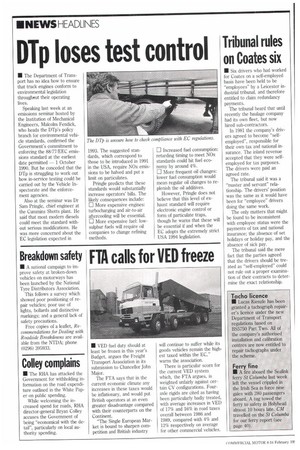Dip loses test control
Page 16

If you've noticed an error in this article please click here to report it so we can fix it.
• The Department of Transport has no idea how to ensure that truck engines conform to environmental legislation throughout their operating lives.
Speaking last week at an emissions seminar hosted by the Institution of Mechanical Engineers, Malcolm Fendick, who heads the Dip's policy branch for environmental vehicle standards, confirmed the Government's commitment to enforcing the 88/77/EEC emissions standard at the earliest date permitted — 1 October 1990. But he conceded that the DTp is struggling to work out how in-service testing could be carried out by the Vehicle Inspectorate and the enforcement agencies.
Also at the seminar was Dr Sam Pringle, chief engineer at the Cummins Shotts plant. He said that most modern diesels could meet the standard without serious modifications. lie was more concerned about the EC legislation expected in 1993. The suggested standards, which correspond to those to be introduced in 1991 in the USA, require NOx emissions to be halved and put a limit on particulates.
Pringle predicts that these standards would substantially increase operators' bills. The likely consequences include: 0 More expensive engines: turbocharging and air-to-air aftercooling will be essential. 0 More expensive fuel: lowsulphur fuels will require oil companies to change refining methods. 0 Increased fuel consumption: retarding timing to meet NOx standards could hit fuel economy by around 4%.
0 More frequent oil changes: lower fuel consumption would mean regular oil changes to replenish the oil additives.
However, Pringle does not believe that this level of exhaust standard will require electronic engine control or form of particulate traps, though he warns that these will be essential if and when the EC adopts the extremely strict USA 1994 leglislation.




















































































































